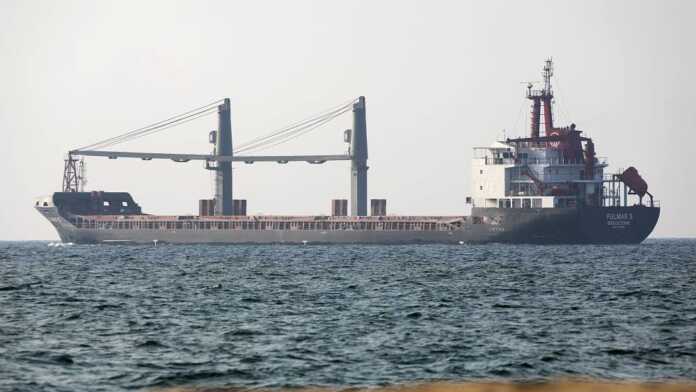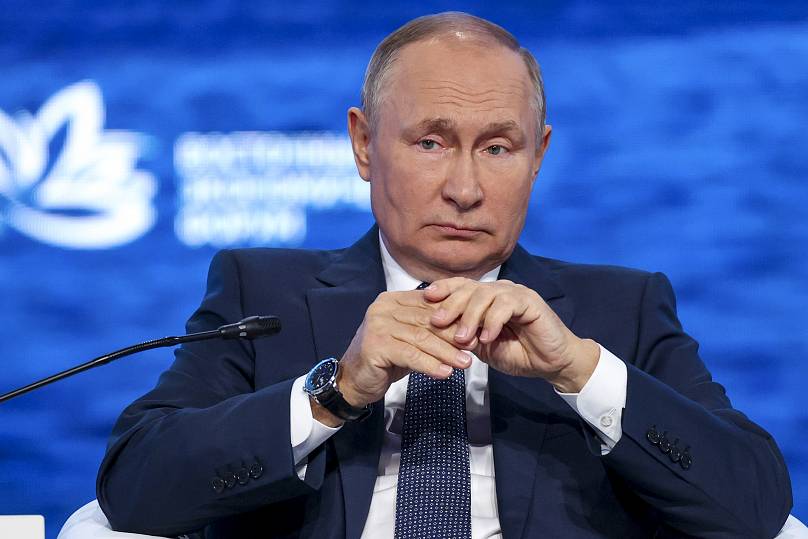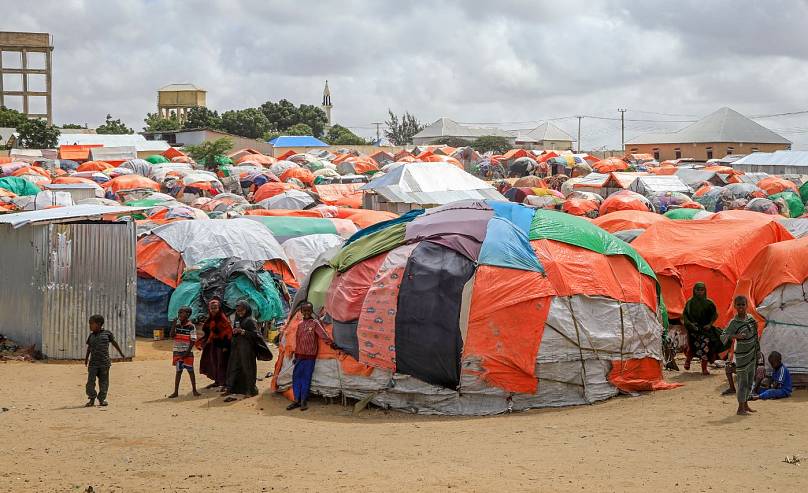Russian President Vladimir Putin has claimed the majority of grain leaving Ukraine’s reopened ports has gone to the European Union.
Speaking at an economic forum in Vladivostok on Wednesday, Putin said the exports had gone to the EU instead of poorer countries around the world.
He has now threatened to meet Turkey to revise the deal that lifted Russia’s blockade on Ukrainian ports in July.
Ukraine’s president, Volodymyr Zelenskyy, has hit back at Putin and says that tonnes of grain will soon arrive in Somalia, where famine is approaching.
Meanwhile, the United Nations’ own figures show that just over a third of the grain they have chartered for release from Ukraine has gone to the EU.
The UN-brokered deal on grain is one of the few agreements signed since Russia invaded Ukraine in February, but the blame game over the issue of world food security continues.
What did Putin say?
Several Russian officials have accused the West of importing most of Ukraine’s grain, but Wednesday was the first time that Putin had echoed the claim with such strong words.
He said that, of 87 ships loaded with grain from Ukraine, just two carried grain for the UN’s World Food Programme (WFP). According to Moscow, that amounts to just 60,000 tonnes out of the total of about 2 million tons leaving Ukrainian ports.
“[The West] cheated the public and partners in Africa and other regions who acutely need food,” Putin said.
“They were claiming that they were acting in the interests of developing countries, but acted entirely in their own interests.”
Since the war began in February, a number of African leaders have visited Russia to meet with Putin and discuss the impact of the port blockade in Ukraine.
Before the war, Ukraine was one of the world’s largest grain exporters, producing enough food to feed 400 million people per year, according to the WFP.
“If we exclude Turkey as an intermediary country, then almost all the grain exported from Ukraine is sent not to the poorest developing countries, but to European Union countries,” Putin claimed.
“It’s obvious that with an approach like that, the magnitude of the food problem in the world will keep growing, and that could lead to an unprecedented humanitarian catastrophe,” he added.
Where has the grain gone?
Speaking in Istanbul on 22 July, UN Secretary-General Antonio Guterres said the Black Sea Grain Initiative would bring relief to “the most vulnerable people on the edge of famine”.
According to the UN’s Joint Coordination Centre (JCC) – run by the UN, Turkey, Russia and Ukraine – 100 outbound ships have so far left Ukraine, carrying more than 2.3 million tonnes of grain.
In a statement to Euronews, the JCC stated that just 36% of this had gone to European Union countries, while 30% of the cargo has so far gone to low- and lower-middle-income countries.
According to the latest data, 20% of grain went to Turkey, while another 27% was distributed among Asian countries; China (7%), The Republic of Korea (6%), Iran (5%), India (4%), Israel (2%), Yemen (2%), and Lebanon (<1%).
Turkey is a popular destination because it is a major miller of wheat, and the grain arriving there could be then shipped to poorer nations in Asia and Africa, or to Europe. The destinations are not recorded by the JCC.
Of the 36% of produce that went to the EU, 15% reached Spain, while Italy (7%), the Netherlands (5%), Romania (4%), Germany (3%), Ireland, France (1%), Bulgaria (<1%) and Greece (<1%) have all benefitted.
The remaining 17% of the cargo has reached African countries; (10%), Sudan (3%), Kenya (2%), Somalia (1%) and Djibouti (1%).
In addition to the JCC shipments, commercial vessels leaving Ukraine have carried a range of food products including wheat, corn for animal feed, sunflower meal, soya beans, sunflower oil and sunflower seed.
Food security experts have said many of these shipments are deliveries on existing contracts that were struck before Russia’s invasion, rather than new shipments that have been earmarked for Europe.
Just three ships under the World Food Programme
“The objective of the Black Sea Grain Initiative is to boost commercial supplies of grain into the market that can help contain and reduce food prices,” a statement to Euronews read.
The UN is hoping to support poor households and vulnerable populations around the world, as well as enable farmers to grow food at a manageable cost.
But while at least 30% of the grain leaving Ukraine has reached countries in need, Putin is correct to say only a small amount has been shipped under the World Food Programme.
So far, the WFP has chartered just three vessels to load wheat from Ukraine in support of its humanitarian operations around the world.
The first planned WFP shipment, which left the Ukrainian port on the Razoni ship in early August, never reached its intended port after the initial Lebanese buyer in Tripoli refused the delivery, citing a five-month delay. The vessel was left to offload much of its 26,000 tonnes of corn at the Syrian port of Tartus.
Only one ship from Ukraine has so far arrived in sub-Saharan Africa, docking at the port of Djibouti on August 30. An estimated 23,000 tons of grain on that ship will go to drought-affected Somalia and Ethiopia, according to the WFP.
The UN says the shipment is enough to feed 1.5 million people on full rations for a month, but food security experts say it is just a drop in the ocean for East Africa’s needs.
Analysts also believe it will take weeks for people in African countries to see grain from Ukraine arrive and even longer to see it bring down high food prices.
In 2021, two-thirds of the 4.4 million tonnes of food aid distributed around the world by the WFP came from Ukraine. Somalia alone had sourced around 90% of its wheat from Ukraine and Russia before 2022.
On Tuesday, Kyiv said that 28,600 tonnes of wheat will arrive in Somalia in the coming weeks.
“Ukraine continues to save the world with its grain,” Zelenskyy wrote on Twitter, blaming the approaching famine in North Africa on Russia’s invasion.
The WFP has a second ship, the MV Karteria, loaded with 37,500 tonnes of wheat for Yemen via Turkey.
“The grain will provide a 50-kg bag of wheat flour to nearly 4 million people for one month and will help WFP address immediate gaps in assistance,” a statement read.
An estimated 46% of Yemen’s 2021 wheat imports came from Ukraine and Russia.
Another commercial vessel authorised to depart Ukraine on Wednesday is bound for Kenya with 51,400 metric tons of wheat, the JCC added.
But the WFP has admitted that “export volumes remain far below pre-conflict averages” and time may be running out.
The July agreement brokered by the UN and Turkey only lasts for 120 days. If Russia continues to press for a revision, the deal may not be extended after November.
















